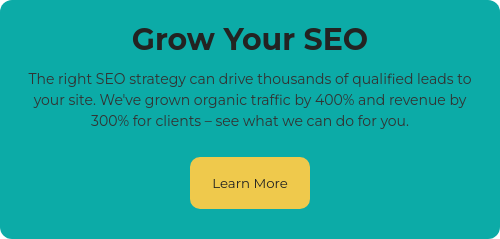As you likely already know, search engine optimization (SEO) strategy is an essential tool for any organization with an online presence. A good SEO strategy means you'll rank high in search engine results when your target audience searches for keywords that are relevant to the products and services you offer. It can also mean saving dollars on paying for expensive PPC keywords.
Your brand likely already has an SEO strategy in place. Can you tell us, in one minute, what that strategy is? It’s important that you don't just have someone running your SEO strategy without insight into the goals, or that you're not just "throwing SEO against the wall and hoping it'll stick." Instead, you need to have a wicked smart SEO strategy that separates you from your search competition. This will strengthen your inbound strategy by helping to bring in new customers, which can fund deeper inbound marketing tactics.
There’s a ton that goes into SEO, so for the best results, we, of course, recommend hiring an inbound marketing agency to help and take the reins. But, if you want to get a jump start on building your own successful SEO strategy, follow these six steps:
1. Know Your Audience
The first and most important step to any quality marketing efforts is to know your audience, and SEO strategy is no different. When you’ve established a target audience, you must learn what they’re most interested in.
What keywords will they use when searching? What questions do they have about the products and services that you offer? How can you use your website to draw in visitors but also create value for them? Information about your audience should tell you:
-
Keywords that they will search for. You can use these keywords in your content so that your pages will rank high in search results.
-
People whom they consider an authority. If there’s someone in the industry whose voice is respected, get them to create a special post for your blog or interview them. You’ll provide quality content for your audience and attract newcomers from the authority’s following.
-
The content that will reach them best. If you have a young audience, a social media presence is essential. If your products lend themselves to “how-to” content, create videos that consumers will be able to watch when they use your product or are in the research phase of their purchase.
2. Audit Your Site
Now that you have a decent understanding of your audience’s needs and interests, audit your site to see how well your site measures up. It’s important to do this as soon as possible as it will help you establish a plan of attack. You’ll be able to decide what your goals are and how you can effectively reach them.
Look at the content on your site that’s getting the most attention and ask yourself the following questions:
-
What’s drawing your audience to that content specifically?
-
Can you create more content with these attributes?
-
How easy is it to understand the content?
-
What’s your site missing that you know your audience wants or needs?
-
Do pages load quickly?
All these things matter to your SEO strategy. If you rank high in search engine results but the consumer can’t find what they need on your site or the pages take too long to load, they probably won’t stay on your site long.
3. Use the Right Keywords
Let’s assume you know what your audience needs, what your website has to offer, and what the website is lacking. Now it’s time to build upon your strategy. Another component of a good SEO strategy is keyword usage, and there are three categories that you should consider – long tail, short tail and local.
Long-tail keywords can be quite specific, whereas short-tail keywords are more general and can be rather broad. For instance, the query “SEO strategy” is short tail, while “SEO strategy for book stores” is more of a long-tail query. The search results you get from the short-tail query may return all sorts of topics, but the long-tail query will likely return mostly book- and store-specific strategies.
Now let’s assume you have a business in Chicago. An example of a local keyword is “inbound marketing agency in Chicago.” This type of keyword is very important because you want your business to be represented in the results when someone in your area needs the type of services you provide. If your competitors are on top of their game, they likely already have a local strategy in place.
When you decide which keywords to use, reference the knowledge you gained in step 1. What’s your audience most interested in? Which keywords do you think they’ll use to get information on that topic? For instance, if you have an app that helps people locate contractors near them, search terms might be "how to remodel a house after you purchased it," "questions to ask before hiring a contractor" or "how to search and find the perfect contractor for a big-time remodel."
One way to spark creativity is to enter one of the queries in Google and look at the “People also ask” section to see relevant queries. When you search “how to find a contractor” you’ll see that people also ask questions such as, “Why is it so hard to find a good contractor?” and “How to find a contractor for home addition?”
You can create content that specifically answers questions, which will help you rank higher, bring in new traffic, and create value and authority for your brand in the eyes of your audience.
4. Create Quality Content
Quality content is the bread and butter of a good SEO strategy. Ever heard the phrase “Content is king”? You can have the fastest-loading page and beautiful imagery, but if your audience feels the content doesn’t meet their needs, they won’t come back.
Determine which type of content your audience seeks, use the keywords that they frequently search for, and create varied content on a regular basis. Create blog posts, videos, social media content, email blasts, whatever you can to reach your audience. A HubSpot study showed that B2C companies who published 16 or more blog posts per month enjoyed 4.5 times the amount of traffic as those that only published 0-4 per month.
An inbound strategy that includes creating great content will show your audience that you provide value for them and that you’re an industry authority. Once consumers begin to realize they can trust you to provide relevant and accurate information, they’ll come to you first.
5. Acquire Backlinks
Another way to establish authority within your industry is with a backlink SEO strategy. Backlinks are links which point to your site from another site. Using our contractor analogy, you could get a certain paint supplier to recommend your contractor search services to their audience by linking to your website from one of their blog posts or service pages. After all, people shopping for house paint may be in the market for a contractor to paint and/or remodel their whole house.
Backlinks benefit both websites. For the paint supplier, they’re creating value for their audience with a recommendation (i.e. the link). Their audience may wonder which contractors they can trust, and the supplier helps answer that question. As the contractor search service, you’ll get advertising on another site that will help your inbound strategy.
Another benefit of a great backlink relationship is when a site links to your site as a source of information. For example, “According to XYZ Contractor Search Service, the market demand for house painting services will increase 10% next year.” When other sites reference you for reliable information, this tells their audience that you’re an important voice and a thought leader in your industry. This means people will start to pay even more attention to your content.
Also, the more that other sites link to yours, the more authority you’ll have in the eye of search engines. To Google, many backlinks from quality websites will mean you’re relevant in the industry and you’re an authority that people trust.
6. Update Your SEO Strategy Frequently
A good SEO strategy is never complete. You need to constantly revisit your strategy, update your website, and create new content to maintain good standing and keep up with search marketing trends. For these reasons, many businesses hire an inbound marketing agency as improving your strategy is no small task.
Are you aware of the latest SEO trends? New strategies for success continue to emerge with new technologies. For instance, voice search is something that many businesses are catering to with the rise in smart home devices like Google Home and Amazon Alexa. Are you aware of all the updates Google has done this year to the algorithm? Those matter to how your ranks change. Do you know what E-A-T is and why it's so important to Google? These are the types of trends and updates a good SEO agency can keep up on for you.
Also, you can’t simply use the same keywords you initially researched for years to come. You must understand what your audience is interested in and stay up to date on the newest tactics and latest news in your industry. If you don’t, you risk becoming irrelevant. Revisit your SEO strategy quarterly to make sure your insights are fresh and relevant.
Create a SEO Strategy Today
Creating and maintaining a good SEO strategy is a lot of work, but the benefit it has to your inbound strategy will make it well worth the investment.
When was the last time you clicked to Google’s second page of search results? The First Page is where it’s at. First Page results will get you more traffic, more leads and more revenue.






